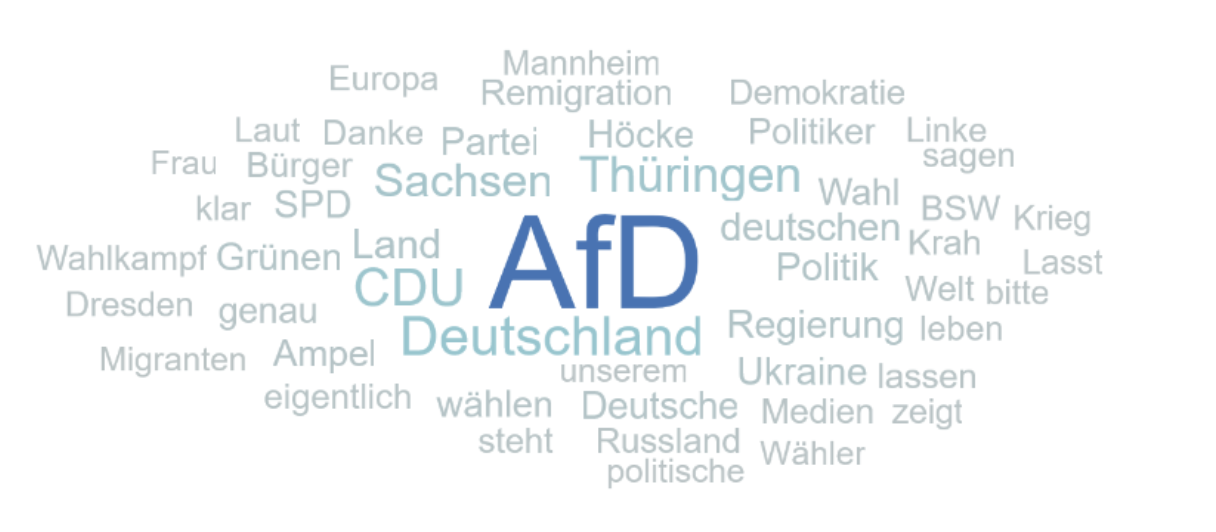Mainstreaming extremism in Germany: State elections in Saxony and Thuringia
4 September 2024
While many reasons have been put forward to explain the success of far-right, populist, and pro-Kremlin parties in the state elections in Saxony and Thuringia in Germany, the most concerning is the ongoing mainstreaming of extremist views. The efficacy of these parties in using social media to build an audience and spread their messages, as well as mainstream parties’ boosting of the salience of extremists’ issue sets, has bolstered these groups’ popularity and electoral prospects. This Dispatch explains the mechanics of mainstreaming and provides several policy recommendations to protect the German state and democracy from extremism.
In the 2024 state elections in Saxony and Thuringia, the far-right Alternative für Deutschland (AfD) and the newly formed Bündnis Sahra Wagenknecht (BSW) made significant gains, signalling a major shift in the political landscape of these regions. The AfD, already a dominant force, further consolidated its position as the leading party in Thuringia and the second strongest in Saxony. The BSW, a splinter group from Die Linke that emerged earlier in the year, capitalised on the popularity of its leader, Sahra Wagenknecht. The three parties of the governing coalition at federal level – the Social Democrats (SPD), the Liberals (FDP), and Greens – fared poorly in both states, with the SPD making marginal gains in Saxony (from a low base), the Greens staying below the five percent threshold in Thuringia, and the FDP failing to enter either parliament.
These electoral outcomes, combined with the weakening of the political centre, have made the formation of new and unprecedented coalitions inevitable. Even though all major parties initially vowed not to collaborate with the AfD, this underscores the growing complexity and challenges of coalition politics in Germany.[1] The Christian Democratic Union (CDU), being the second strongest party in Thuringia, entered coalition talks with the SPD and BSW, giving Wagenknecht’s party the opportunity to join a state government less than a year after being launched.
In Thuringia, the AfD wields significant power through the blocking minority it acquired with one third of the seats, allowing it to influence state policies, legal frameworks, judicial appointments, and constitutional changes. Meanwhile, the re-counting of the votes in Saxony, which led to the AfD and CDU losing one seat respectively, triggered a myriad of conspiracy narratives on election integrity, which echo similar narratives spread in the U.S. after the 2021 elections. The rise in far-right violence in 2024 heightens concerns that these developments could further destabilise democratic processes and erode public trust. In addition, leading AfD voices are increasingly questioning whether the decision not to collaborate with them respects the election outcome and the “will of the voters”, further igniting discussions on electoral integrity and the legitimacy of the new governments in both states.
While the political firewall against the AfD still seems to be holding, the election results and post-election polls make it clear that large sections of the population in both Saxony and Thuringia support the AfD’s policies out of conviction rather than protest. The increased political presence of the AfD is also likely to continue this trend and make right-wing extremist attitudes even more prevalent in people’s everyday lives. In addition, the strong showing of the populist, anti-immigration, pro-Russia BSW points to further support for illiberal and authoritarian policies. Together, these two parties – which have vowed not to collaborate – hold nearly half the seats in the Saxon parliament and an absolute majority in Thuringia.
Driving the results: Voter turnout and social media campaigns
One key factor in these results was the successful mobilization of many first-time-voters as well as non-voters, who had previously been disengaged from the political process. Rather than drawing support away from the AfD as announced after its founding, the BSW primarily attracted newly active voters, while the AfD maintained and even expanded its existing base. This surge in voter turnout among previously apathetic citizens further strengthened both the AfD and BSW, intensifying the political shifts in these states.
Polling after the elections in both states indicated that issues such as social security, immigration, crime and economic development defined voting decisions in both Saxony and Thuringia. In Thuringia, education also played a significant role; this is an area that is primarily handled at state level. Despite these primarily state-level issues holding voter salience, both AfD and BSW were able to achieve success with campaigns that often focussed on issues more generally handled at the federal level.
The AfD’s campaign focused on anti-immigration policies, scepticism towards the European Union and the federal government’s support for Ukraine – topics that are primarily handled on the federal level. An ISD analysis of the AfD’s most popular Facebook content since the start of its state election campaigns reveals that the party opportunistically blends core themes like immigration with broader foreign policy objectives, such as a strong push to achieve peace with Russia, alongside regionally significant issues like economic concerns – few of which are actually within state (as opposed to federal) competence to deal with. The AfD tapped into growing fears about economic stability, rising crime rates, and cultural identity, benefitting from its ability to address regional discontent and thereby distinguishing itself from other parties. The party also positioned itself as a defender of traditional values against what it portrays as the “political establishment’s” progressive agenda, particularly on issues like gender identity and climate policy.
The AfD’s success may also in part be attributed their social media activity. The AfD was once again the party most present on TikTok, especially in the feeds of first-time voters (followed by BSW with a considerable distance). Moreover, the AfD managed to leverage TikTok’s specific mashup and meme culture. Among other things, this included a presumably AI-generated AfD song that numerous female TikTok users danced and lip-synced to. The content: patriotism and pride in voting for AfD.
Data from X accounts affiliated with AfD and its candidates in Thuringia and Saxony show that migration was one of the most frequently discussed topics on the platform, with the word “remigration” pointing to the party’s extreme rhetoric. This term, used by far-right actors to advocate for the deportation of migrants, has been central to AfD’s recent campaigns both online and offline, contributing to the normalisation of the concept through the high visibility of the party.

Figure 1: Keyword cloud showing the most frequently used terms on X by accounts affiliated with AfD and its candidates in Saxony and Thuringia.
The BSW, while sharing many of the AfD’s positions such as a criticism of the federal government’s stance on Russia and support for Ukraine as well as its anti-immigration policies, also adopts typical left-leaning positions on social issues such as unemployment, education and pension policies, which are further reflected in the party’s programme. For instance, the BSW campaigns for free lunches in kindergartens and schools, against the increasing privatization of healthcare and for the redistribution of wealth. Wagenknecht’s party benefits greatly from her persona and reputation as she has strong regional ties in former East Germany, having grown up there.
While many reasons – as well as those analysed above – have been put forward to explain the outcome of both state elections, some having to do with the distant (Nazi) or more recent past (the communist era and the unification period), what is most worrying is the mainstreaming of extremist views. This openness to far-right ideologies is exacerbated by the failure to adequately address past incidents of far-right violence, particularly in the 1990s, such as those in Lichtenhagen and Hoyerswerda. The lack of a comprehensive reckoning with this history has allowed far-right sentiments to persist, normalize and solidify, contributing to the strong support for parties like the AfD in these regions.
The mainstreaming of extremism
The AfD’s biggest success in the 2024 state elections is not merely becoming the largest party in Thuringia and second largest (by a hair’s breadth) in Saxony, but rather its ability to (again) mainstream its agenda. By pushing its issues to the forefront, particularly on migration and asylum policies, it forced the other parties to engage with their narrative, thus significantly shaping the political discourse. Once mainstream parties started to adopt the language of the far-right, , this legitimized and normalised the AfD’s rhetoric further – while at the same time neglecting the most important topic for voters: social security. This territory was ripe for the BSW, which combines a mainstreamed anti-immigration stance with a focus on social grievances.
Beyond these elections and the preceding campaigns, there are various underlying factors for the normalisation of extremist sentiments in the German population: social inequalities since the 1980s and the continuous erosion of social and democratic structures; acute crisis contexts that fuel existential fears and generate information vacuums, which extremist and populist actors exploit to spread their messages and recruit new supporters; and platform systems on which extremist influencers have established themselves for years by having their emotive and inciting content algorithmically amplified, helping to build a loyal following and reach new target groups.
At the same time, responses to extremism – defined by ISD as a supremacist ideological project rooted in the dominance of an identity-based ‘in-group’ over an ‘out-group’ – are often erroneously framed in terms of fringe or marginal views, or exclusively through the lens of violent activity. However, the results in Saxony and Thuringia speak to a broader ‘mainstreaming’ dynamic, characterised by long-standing efforts to advance a de-humanising ‘othering’ mind-set, polarise civic discourse and undermine democratic institutions and culture. Efforts to address such mainstreaming must recognise that extremism, in addition to posing major risks to public safety, is also by its nature antithetical to pluralism and universal human rights.
That’s not to say that nothing has been done so far. To the contrary, Germany’s near decade-old Demokratie leben! (Live Democracy) funding programme by the Federal Ministry for Families, Seniors, Women and Youth has also correctly sought to root counter-extremism efforts in the broader context of democracy protection through funded community initiatives. Still, even the designation by the Verfassungsschutz (Federal Office for the Protection of the Constitution) of the AfD’s regional chapters in both Thuringia and Saxony as “confirmed right-wing extremist” did not deter three out of ten voters from casting their ballot for them.
These developments pose a significant challenge to the German political landscape, as it risks shifting discourse toward more exclusionary and nationalist policies. This could potentially erode the values of openness and tolerance that underpin Germany’s democracy, while endangering its socio-economic model based on international trade.
Conclusions and recommendations
These election outcomes highlight a fundamental shift in Germany, with voters increasingly turning to parties that promise to challenge the status quo. However, uncertainties remain about how these results will translate into governance, especially considering the challenges of forming coalitions. The broader implications for Germany’s national politics and the stability of democracy are still unfolding, making it crucial to closely monitor how these developments will shape the country’s political landscape.
While reversing these trends is a long-term challenge for democracies better adapted to the disruptions caused by megatrends such as digitisation, climate change, and demographic decline, measures are also needed in the short and medium term to effectively and appropriately counter extremist attitudes and the resulting threats to security and democracy.
First, the German constitutional order urgently requires ‘hate proofing’ to ensure that extremist and populist actors cannot exploit it. This stretches from establishing safeguards to the constitution and democratic processes, to the protection of constitutional courts and judicial independence, as well as measures to ensure media freedom.
Secondly, measures supporting and strengthening the role of civil society, especially in states that the political landscape is becoming increasingly hostile, need to be introduced, including funding and legislation. For instance, the federal legislature must propose a draft of the Act on the Protection against Digital Violence before the end of legislative term. This needs to provide for the maintenance of a resilient democracy and ensure safe participation in public discourse for minority groups and women.
The swift adoption of the Democracy Protection Act, which has long been on the political agenda, is also essential. This will support democracy, extremism prevention, diversity and political education projects much more efficiently and effectively. The act is meant to strengthen German civil society through a permanent legal mandate from the Federal Government to ensure an active and robust civil society. While there is criticism over the question of whether the federal government is responsible for funding democracy initiatives, it is now up to the German Bundestag to dispel constitutional concerns quickly.
The election results show a clear need for even greater work at a local level, with prevention geared towards addressing extremist ideas increasingly in the mainstream rather than at the fringes. This includes targeted support for local communities impacted by extremism (e.g. litigation support and protection from hate crime), scaled civic education and empowerment aimed at both young people and adults at risk of extremist propaganda, as well as tougher action against hostile states fomenting domestic extremism. The development of a comprehensive strategy for countering mainstreamed extremism will likely require more robust data, and thus also the access to data and more transparency by social media platforms as outlined in the DSA, to understand these fast-moving threats in real time, in terms of both online mobilisation and offline impacts.
Meanwhile, democratic initiatives and civil society are under scrutiny due to an increasing number of attacks from the extremist parts of society and foreign states, be they coordinated attacks on their reputation or legal attacks on their non-profit status. This is why the legislature must introduce protective measures for charitable organisations. One means is through modernising charity law, namely the German Tax Code. A revision of the law would allow charitable organisations to ensure democratic participation while also being mindful of “false equivalence” and giving space to extremist voices. Civil society organisations showing solidarity with the community would not be risking their charitable status by declining participation of anti-democratic actors.
This leads to a third set of measures, involving the more consequential use of legal proceedings against extremist actors and the exploration of instruments provided by the constitution to safeguard German democracy. The legal framework, grounded in the German Constitution, allows for the prohibition of organisations that threaten the democratic order.
These recommendations – ‘hate-proofing’ the German constitutional order, measures to support civil society and activists, and safeguarding non-profit organisations against attacks from extremist actors – can contribute to combating extremism and its effects. However, advocates of liberal democracy and opponents of extremism must also significantly expand their presence on social media platforms without polarising themselves. This will also be a resource question that the state cannot answer, and rather requires innovative approaches driven by non-state actors.
End notes
[1] For an in-depth discussion on the challenges of coalition building after the state elections in Thuringia and Saxony, see ISD’s recent report From Posts to Polls.



